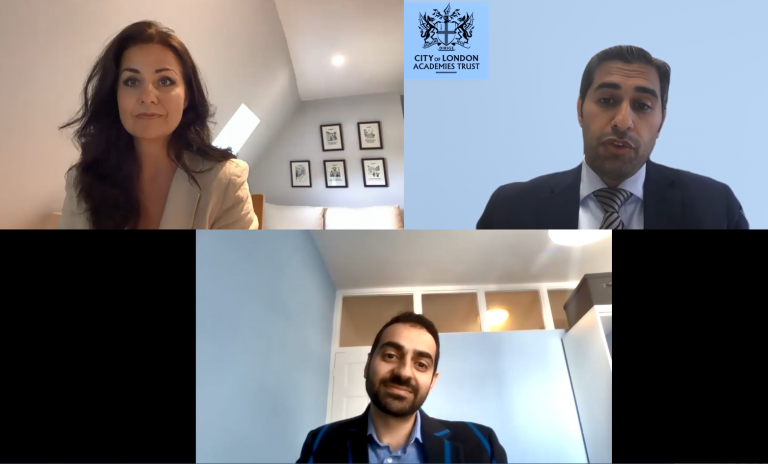How to change career successfully
27 July 2022
A UCL alumni panel chaired by former MP Heidi Allen have shared their experiences and insights of changing job sector.

“I had a bit of a eureka moment!” said panel chair Heidi Allen (BSc Astrophysics 1996) about her decision to leave her corporate job to work in Parliament, becoming MP for South Cambridgeshire from 2015-2019.
Joining Heidi on the alumni panel at a recent UCL Connect professional development event about successfully changing careers were Dr Fawzi Abou-Chahine (MSci Chemistry 2009) and Mouhssin Ismail (PGCE 2007). Fawzi transitioned from a career in academia to industry due to financial considerations and a desire to “understand how I could apply a lot of the science I had learnt into industry and generate real impact for people” while Mouhssin left his job as a banking and finance lawyer to become a head teacher after witnessing the lack of social mobility in his former profession. “The whole idea about the moral imperative was really important,” Mouhssin said.
Whatever the reason behind a career change, it can be a daunting process. Drawing on their own experiences of successfully changing sectors, the alumni panel members shared their insights and advice to support others in the UCL student and alumni community who want to do the same.

Heidi Allen, Mouhssin Ismail and Fawzi Abou-Chahine
Do your research
The panel highlighted a list of key questions to consider carefully before taking the leap:
- What motivates you?
- If and how your decision might affect your family and those close to you?
- Whether you are happy to begin again and to, potentially, take a pay cut?
Mouhssin revealed that lots of legal professionals approach him to ask him about the transition from law to teaching: “My question to them is always ‘are you willing to give up your salary? Do you love the idea of teaching that much?’”
While research is crucial, in the end often these decisions are best made from the heart. Mouhssin went on to add: “I knew in myself I wanted to do something different…the emotion drove my decision and the rationality kicked in afterwards!”
Leverage your existing skills
Whatever your background and experience, the panel encouraged the audience to take time to recognise and capitalise on the many skills that you will have developed that will stand you in good stead for a career move.
“I viewed myself as ‘just a chemist’, but I was actually a person who had all sorts of skills, who also could do chemistry,” said Fawzi, whose academic career, he came to realise, equipped him with a wealth of transferrable skills, from project management to communicating complex ideas simply.
In fact, experience in a different sector can prove to be advantageous in the long term and ensure you’re able to bring unique value to an organisation. Mouhssin, explained: “As I moved up the hierarchy, I found that my legal background became even more pertinent. As a lawyer, I did seats in HR, finance…the complexity of running a school, because of my legal background, became a bit more manageable and easier for me to overcome than for someone who didn’t have the same background.”
Coping with feelings of insecurity
The process of changing careers and going back to basics can bring feelings of insecurity, particularly as you’re starting out. These experiences were shared by the panel, with Heidi saying how during the early days of her career in Parliament, she had moments of self-doubt, wondering whether she’d made the right decision.
A productive way to cope with moments like these is to reframe them as opportunities for learning, suggested Heidi: “Being out of your comfort zone is absolutely how you learn. If you’re just doing the same thing all the time, you don’t grow, you don’t develop and you don’t acquire new skills.”
Whether from a professional mentor or someone who has been in your shoes, Fawzi recommended not being afraid of asking for help during difficult times: “Being able to stand up and say I’m having a difficult time is the way to resolve that.”
“Be bold and brave”- Mouhssin Ismail
The importance of fear not dominating decision-making was also discussed by the panel. Mouhssin spoke about how courageous decisions require greater personal responsibility but bring greater rewards. He explained that: “A lot of time in our careers, we’re waiting on people to make opportunities for us. I think we need to be bolder and braver about what we want out of our own careers.”
Concluding the event, Heidi encouraged the audience to be bold and take a leap of faith: “All of it is doable. Everyone can be what they want to be. Just have that self-belief and equip yourself with the tools to make it happen.”
Want to find out more?
To discover more tips and stories from our alumni panel, watch the full recording of the How to...change careers event.
To expand your learning further, explore more UCL Connect content. UCL Connect brings professional development opportunities and expertise from alumni to the UCL community, so you can take the next steps in your career with confidence.
 Close
Close




